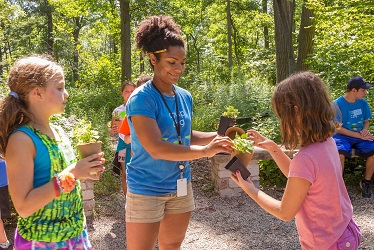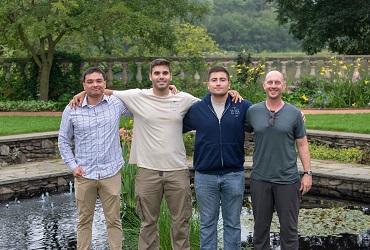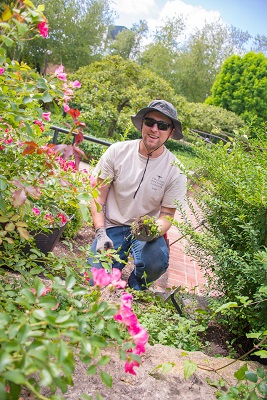Blog Posts | November 8, 2019
Share ThisBy Erica Jaros

The military becomes a way of life for those on active duty across the U.S. or deployed overseas. Whether serving four years or 20 years, service members develop routines and habits that impact all aspects of life. Veterans have a lot going on when they transition out of the military, and it can be difficult to adjust, but some museums provide services to help them navigate this journey.
Museums and other cultural institutions can be well suited for this role because of the diversity of employment and training opportunities they offer, including internships and volunteer programs. One such example: in 2015, the Chicago Botanic Garden received a Museums for America grant from IMLS to fund a fourteen-week Veteran Internship Program (VIP) at the Garden in 2016 and 2017.
“With hundreds of thousands of military members separating each year, it is important to have programs at companies with high quality work environments designed to accommodate the specific needs of veterans returning to the civilian workplace,” said Alicia Green, coordinator of the Buehler Enabling Garden and manager of VIP.
Some transitioning veterans are overcoming physical and mental health challenges, while others struggle with relating their military skills and culture to a civilian work environment. The VIP program combines workforce training, pre-vocational internships, and therapeutic horticulture to help service members transition into the workforce while addressing emotional reintegration challenges.

During the program, veterans attend employment training sessions once a week to work on resumes and skills in interviewing, professional social media use, networking, and workplace culture. During these sessions, guest speakers discuss specific topics and the veterans prepare a presentation on their work area, including a tour of the site.
The weekly meetings allow veterans to talk about what they were learning, various experiences, and any struggles. The program also engages the veterans in nature-based activities to reduce stress and provide coping mechanisms, such as creating dish gardens with sensory qualities or learning about bonsai tree potting and care.
The Garden’s internship opportunity is unique, as it provides members of the military community with opportunities to learn about the variety of careers available at a botanic garden or museum, helping veterans think outside the box when considering career options. The Veteran Internship Program at the Garden offers positions in multiple areas of the institution, including accounting, visitor services, education, and the Garden’s library.
Aspects of the VIP program at the Garden have the potential to be replicated at other institutions to help veterans translate their military skills into civilian careers or opportunities.

“Our Garden offers the opportunity to access a diverse offering of careers on one campus,” said Green. “What makes the Garden especially unique is the structure of the campus with nature and beautiful gardens surrounding all who work here. This feature contributes to a higher than average quality of work life which can be beneficial to someone transitioning.”
After learning from the first two years and getting feedback from participants, the program continues to move forward. The Chicago-based Robert R. McCormick Foundation recognized the need for programs like this and provided initial matching grant funds in 2016. At the end of the pilot, the foundation also stepped in to help the Garden continue serving the veteran community. With the initial investment from IMLS and the McCormick Foundation’s annual support, VIP thrives today as a twelve-week internship, with plans to serve eight veterans in 2020.
Since 2016, 29 veterans have joined the program and 25 have completed their internships. According to Garden leaders, the most significant program accomplishment has been hiring nine graduates into positions at the Garden, including two who have completed college and are now pursuing careers in horticulture. Additionally, in 2020, the Garden plans to hire a veteran mentor—someone who has graduated from the program—to support participants in their weekly group meetings.
“Many of the veteran interns are exposed to working at a public garden for the first time with this internship,” said Green. “A positive side effect of the VIP at the Garden is the creation of ambassadors for the Garden, nature, conservation, and an appreciation for what part museums can play as leaders in the community for various environmental and social issues.”
For more information: Interested in learning more about how to support veterans? Check out Community Salute, an IMLS initiative aimed at strengthening the ability of libraries, archives, and museums to respond to the needs of the nation’s 22 million veterans and military families.
Erica, Communications Specialist at IMLS, also currently serves as a staff sergeant in the South Carolina Army National Guard.
